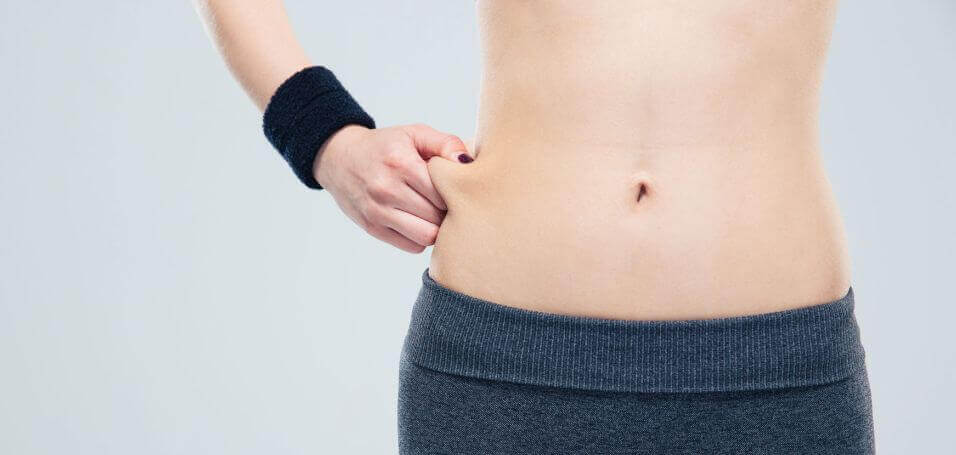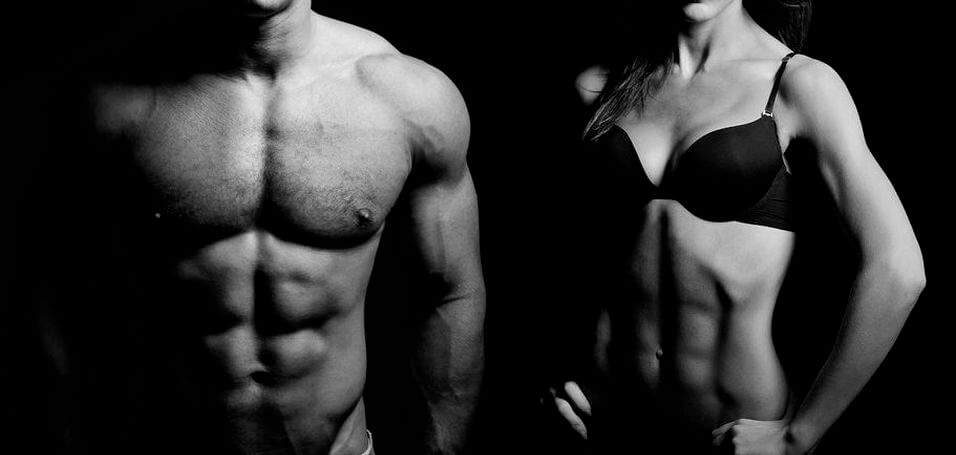If you plugged your nose before clicking into this, I understand.
You’re probably expecting me to pitch you on some body wrap, detox tea, or magic fairy dust that — Scout’s honor — Britney Spears secretly used to melt away her stubborn belly fat.
And your heart is going to sink. It’s another one of those kinds of articles.
But…what if?
What if shrink wrapping yourself in civet-poop coffee or guzzling kumquat-infused rainforest mist really is the “one weird trick” your personal trainer won’t tell you?
What if this really is the universe reaching out to give you a chance to be skinny and beautiful again?
*blows a vuvuzela in your face*
Enough.
This isn’t one of those articles. I’m not going to try to hornswoggle you into buying or believing anything.
Instead, I’m going to give you the cut-and-dried, science-based facts on losing weight without exercise.
As you’ll see, it’s terribly easy, really, but it’s not without its drawbacks. Namely, increasing the likelihood that you’ll wind up skinny fat.
So, by the end of this article, you’re going to know how to lose weight without exercise, but you’re also going to know how to lose weight while actually improving your body composition, which is far more important than the number on your scale.
Ready?
Let’s do it.
- How to Lose Weight Without Exercising
- The Problem with Losing Weight Without Exercise
- The Bottom Line on Losing Weight Without Exercise
Table of Contents
+How to Lose Weight Without Exercising

How do you think it works?
- Eating clean?
- Low-carb dieting? Low-sugar? Gluten-free? Paleo?
- Overdosing on fat burner supplements?
- All of the above?
How about none of the above?
That’s right. None of that guarantees anything in the way of weight loss.
What does is this: A caloric deficit.
That is, eating fewer calories than you burn.
You see, the overarching mechanism in play here is energy balance, which is the relationship between the amount of energy you eat and burn.
The unit of measurement we use when discussing energy balance is the calorie, which is the amount of energy required to heat one kilogram of water one degree Celsius.
Energy balance is a vital concept to understand because it alone determines how your body weight changes over time (and how many calories you should be eating).
You see, the real “secret your personal trainer isn’t telling you” is this:
- You have to burn more energy than you eat to achieve meaningful weight loss.
- You have to eat more energy than you burn to achieve meaningful weight gain (both fat and muscle).
Now, if you’re tempted to scroll up to top of this article to see if it was written a decade ago, know this:
If you take the time to peruse the last century of metabolic research, you’ll find that every single well-designed weight-loss study, including numerous meta-analyses and systematic reviews, have determined that we have to expend more energy than we ingest to achieve meaningful weight loss.
Yes, every single one.
In the realm of metabolic science, this isn’t just old news — it’s an immutable bedrock of the discipline, and doubting it is akin to questioning whether the earth is round.
This is why the canker sores of calorie-denying fad diets that erupt into the mainstream every year, one for one, fail to gain scientific acceptance. No, you can’t “eat yourself skinny” or “hack your metabolism” with “negative-calorie, fat-burning foods.”
You can eat fewer calories than you burn.
It’s also worth noting that bodybuilders, whose lives revolve around manipulating body composition, have been using these simple scientific principles for decades now to systematically increase and reduce body fat levels.
So, the bottom line is this:
100 years of metabolic research has proven beyond question that energy balance, operating according to the first law of thermodynamics, is the primary mechanism that regulates body weight.
That doesn’t mean you have to count calories to lose weight, but you do have to understand the relationship between caloric intake and expenditure and weight gain and loss.
So, now that the stage is set, let’s bring back the subject at hand: losing weight without exercising.
When you think of “burning calories,” what do you think of?
Working out, right?
Well, your body burns calories all day long, not just while running or busting out burpees.
This is known as your “basal metabolic rate,” or BMR, for short, and it’s the minimum amount of calories that you burn every day (the minimum amount of energy it costs to stay alive).
When you factor in additional energy burned through physical activity of any sort, including walking, workouts, and naked badminton with Mr. and Mrs. Sackrider (hey, I’m not judging), you get your total daily energy expenditure (TDEE).
And once you know your TDEE, all you have to do to lose weight is eat significantly less than that number of calories every day.
For example, if you calculate that you burn about 2,200 calories per day, and you ate about 75% of that amount, or ~1,650 calories, then you’d lose about one pound per week. Regardless of whether you exercised or not.
Doing this is known as creating an energy or caloric deficit, because it means your (food) caloric intake is too low for your body’s needs. It then taps mainly into fat stores to fill the energy deficit.
The individual foods you eat has no bearing on this, by the way.
The truth is foods have no special properties as far as weight loss is concerned. They can’t themselves make you fatter or leaner.
What foods do have, though, is varying amounts of calories and protein, carbs, and fat, and that means that some foods are better for losing or gaining weight than others.
Notice I said better, not best, mandatory, forbidden, or anything else that smacks of dogma, because if you know how to regulate and balance your caloric intake properly, you can eat just about anything and lose weight.
Hard to believe, I know, but it explains “curious” phenomena like the professor that lost 27 pounds in 10 weeks on a “convenience store diet” consisting of protein shakes, Hostess and Little Debbie snacks, sugary cereals, and Oreos.
And the guy that lost 56 pounds eating nothing but carefully controlled portions of McDonald’s for six months.
They wanted to prove one simple but very important point:
If you consistently consume fewer calories than you burn, you’ll lose weight, even if those calories come from junk food.
That’s why a study conducted by scientists at Duke University found no difference in weight loss between subjects consuming 4% and 43% of their calories from sugar.
And why those findings were echoed in another study, this time conducted by researchers at Queen Margaret University College.
And why yet another study conducted by scientists at Maastricht University found that when calories, protein, and fiber were kept equal, there was no difference in weight loss or body composition in those on high-sugar compared to low-sugar diets.
In the context of body weight, calories are what count the most. End of story.
The Problem with Losing Weight Without Exercise

I mentioned earlier that while you can easily lose weight without exercise, it’s not the best way of going about weight reduction.
The reason why is simple:
The weight you lose won’t come exclusively from fat. Depending on how you eat, a fair amount can come from muscle, too.
And the more muscle you lose, the slower your metabolism and weaker your immune system becomes, and the worse you look in the mirror (skinny fat, remember?).
That’s why your goal should never be merely to “lose weight,” but to “lose fat and not muscle,” instead. That is what will give you the body you really want.
And this where exercise makes a triumphant return, because the only way to actually accomplish that is to work out while dieting.
Not just any type of workouts, either, but resistance training workouts. Think weightlifting, and not cardio.
When you combine proper weightlifting with proper dieting, the results can appear miraculous to the uninitiated.
You can gain muscle and strength and lose fat at the same time. You can build yourself a whole new body.
That isn’t to say that cardio can’t help you lose weight faster, of course. It can, but it can also help you lose muscle faster.
Let’s take a closer look at both sides of this coin.
Resistance Training and Weight Loss
If research clearly shows that weightlifting speeds up fat loss, why is it generally associated with “bulking up” and not “slimming down”?
Well, most people don’t turn to weightlifting when they want to lose weight for a good reason:
It’s a bad way to lose weight…but a fantastic way to lose fat faster while preserving, or even gaining, muscle.
A study conducted by scientists at Duke University illustrates this perfectly. Researchers recruited 196 men and women ranging from 18 to 70 years old and split them into three groups:
1. Resistance training
These volunteers exercised three days per week and did 24 sets per workout using resistance machines. Each workout lasted about an hour.
2. Aerobic training
These volunteers jogged 3 days per week at a moderate intensity for about 45 minutes per session.
3. Resistance and aerobic training
These volunteers did both of the routines above, putting their total weekly exercise time just over 5 hours.
After eight months, who do you think lost the most weight?
If you answered group three…you’re wrong. Group two (cardio only) did. The kicker, though, is they’re also the only group that lost muscle.
When researchers looked at body composition instead of body weight, they found that group three fared best. They lost the most fat and actually gained muscle.
These findings are in line with several other studies as well, which makes for a very clear picture:
If you want to lose fat faster and preserve or even gain muscle, you want to do both weightlifting and cardio.
Cardio and Weight Loss

What’s the first thing most people do when they want to start losing weight?
Sure, starve themselves, but what else?
Some form of cardio, right? You know, jogging, swimming, cycling, alternating between barely moving and doing mundane stuff on Nintendo’s little white thing, and the like.
This is all well and good but, unfortunately, just doing cardio guarantees little in the way of weight loss.
In fact, many people wind up even fatter than when they began their cardio routines, which isn’t surprising given how many overweight people are addicted to burning calories instead of getting fit.
There are two primary reasons for this.
It’s too easy to eat the calories you burn.
Guess how much energy 30 minutes of vigorous running burns?
For someone that weighs 150 pounds, about 400 calories.
And guess how easy it is to eat that right back?
A handful of nuts, a yogurt, and an apple does the trick. Or if you’re the “flexible dieting” type, a measly chocolate chip cookie with a cup of milk.
My point isn’t that you shouldn’t eat nuts, yogurt, apples, or cookies when you want to lose weight, of course, but that cardio just doesn’t burn as much energy as we wish it did.
Yes, the energy you do burn does support your weight loss efforts, but your goal isn’t to just burn calories, it’s to lose fat. And if you’re eating too much, no amount of cardio is going to get you leaner.
Your body adapts to the exercise to reduce caloric expenditure.
The most common reason people hit weight loss plateaus is rather pedestrian:
Overeating.
It’s just too easy accidentally eat too many calories (and here’s why).
But even if you don’t make the “newbie mistakes” that account for most weight loss problems, you can be tripped up by this:
Research shows that when in a caloric deficit, the body strives to increase energy efficiency. This means that, as time goes on, less and less energy is needed to continue doing the same types of workouts.
Most people don’t know that, though, and think they’re burning more energy than they actually are and, thus, think they can eat more than they actually can.
And when the weight loss sputters, they often try to fight the fire with fire by doing more cardio.
This may raise energy expenditure enough to get the weight loss needle moving again, but it can also accelerate muscle loss and metabolic slowdown.
All this is why I generally recommend that people keep cardio to a minimum when dieting to lose fat.
That is, the less cardio you can do while still reaching your weight loss goals, the better.
The Bottom Line on Losing Weight Without Exercise

Losing weight without exercise is easy.
Eat significantly fewer calories than you burn and, voila, you’ll lose weight.
The problem, though, is at least some of it will be muscle, and that’s not the kind of weight you want to be losing.
That’s why it’s smart to think “improve body composition” and not “lose weight,” and to do at least the bare minimum exercise needed to preserve muscle while dieting.
And fortunately, it doesn’t take much exercise to do that. A couple intense weightlifting workouts per week does the trick (and helps you lose fat faster, too!).










